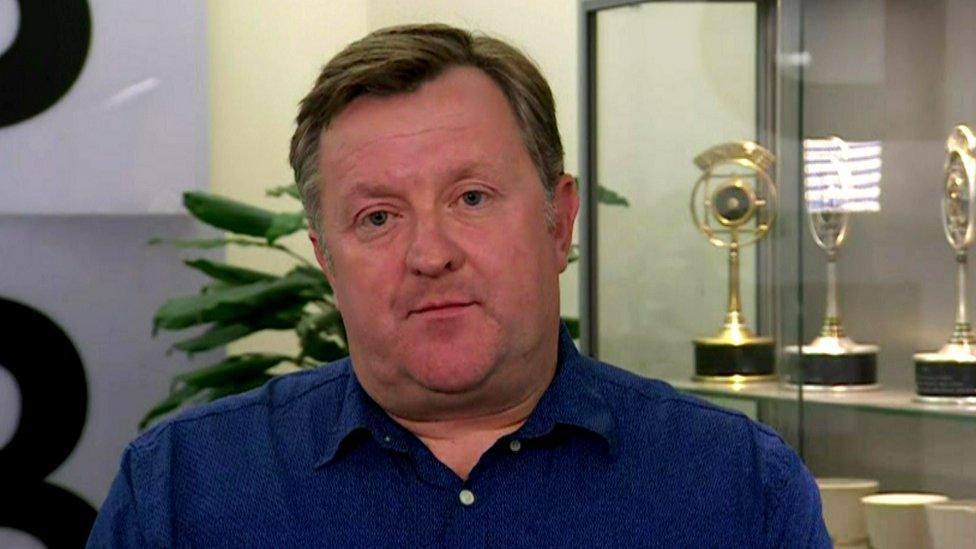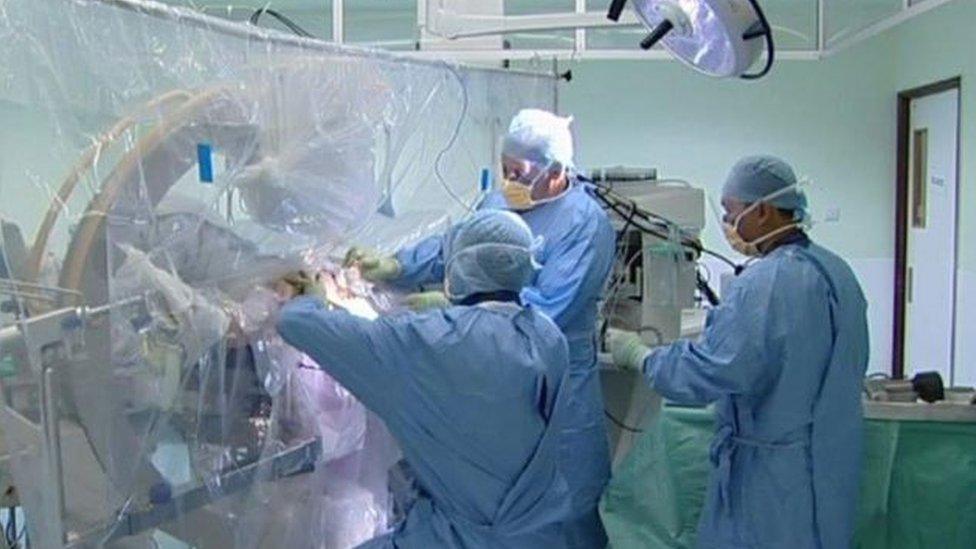Coronavirus: Call for surgery beds to be ring-fenced for second wave
- Published
- comments

Mark Taylor is a surgeon based at Belfast's Mater Hospital
There has been a call to ring-fence hospital beds for planned operations to avoid a "tsunami of cancellations" during the second wave of Covid-19.
The appeal has come from the Royal College of Surgeons (RCS).
A surgeon based at Belfast's Mater Hospital told BBC News NI the move would mean "ring-fencing beds, theatres and most importantly staff to work in the theatres even with a second wave".
Hospital waiting lists in Northern Ireland are the highest across the UK.
Mark Taylor said the college is greatly concerned about those who are waiting and have been waiting for surgery, some for years.
"The message from this RCS report is how we can be minded of, but at the same time how can we bring about a different way of progressing through this second wave that includes some of the vital diagnostic and surgical services," he said.
Mr Taylor said it was important that all life-threatening conditions are dealt with.
"It is really important because we know we have very bad waiting lists and it is also really important because there are very many timed dependent conditions that still require surgery even with a second or third wave of the pandemic," he said.
"So any time dependent surgery, the sooner you operate on a patient the better the outcome to improve their health or, in some cases, to deal with those life-threatening conditions."

The RCS was responding to a survey which questioned nearly 1,000 surgeons across the UK.
The call to ring-fence beds was made as the RCS of England published data which showed that the NHS has been unable to meet its target of returning surgery to 80% capacity by the end of September.
'Bruised and scarred'
The Health Minister Robin Swann told the Assembly that he welcomed the RCS report and that he planned to discuss it with them at a meeting on Wednesday.
But he also highlighted the ongoing challenges that his department is facing.
"Our health and social care system is already badly bruised and scarred by Covid but it is picking itself up and is once again ready to care for us all despite the immense pressures on staff," he said.
The Department of Health has been trying to push ahead with developing plans to reshape how health and social care is transformed in the future.
But pressures could, according to the Minister, make the progression of some earlier plans to develop services difficult if not impossible at this stage.
'Lack of access'
In July, the service set an objective to return to 90% capacity by the end of October, but RCS England's findings show efforts to meet the target falling behind.
The survey found that only 14% of surgeons could treat the same number of patients in a session as pre-Covid.
In fact most reported that where they might have treated four patients in a session, the number now would be "only two or three".
Other findings include:
Nearly half (48%) said they need access to more theatres and facilities to avoid surgical "down time" during deep cleaning, with many citing the need for more ring-fenced surgical beds
Four in 10 (39%) respondents in England said elective activity levels were running at less than 50% of those achieved last year, and nearly half (48%) reported that elective activity levels were between 50% and 80% of those seen in 2019
Treatment rates are particularly low in trauma and orthopaedics - where operations to repair or replace hips, knees and other joints take place - with three in five (58%) T&O surgeons saying activity has fallen below 50% of the norm
According to the RCS, planned surgery for everything from knee operations to replacement heart valves was put on hold in March, to free up NHS capacity for Covid patients.
The NHS asked hospitals to start surgery again beginning in mid-June, but professionals cite multiple barriers, including a lack of access to fast-testing for patients, a lack of staff, and a lack of critical care beds.
There is a suggestion to create Covid-light hubs which keep surgical patients safe and separate from Covid patients.
In its report 'Protecting surgery through a second wave', RCS England calls for guaranteed access to fast COVID tests for surgical staff, to keep the virus off surgical wards. .
Forty-three per cent of the surgeons surveyed said there was spare capacity in the independent sector which could be used to treat NHS patients more quickly, if appropriate contracts were put in place.